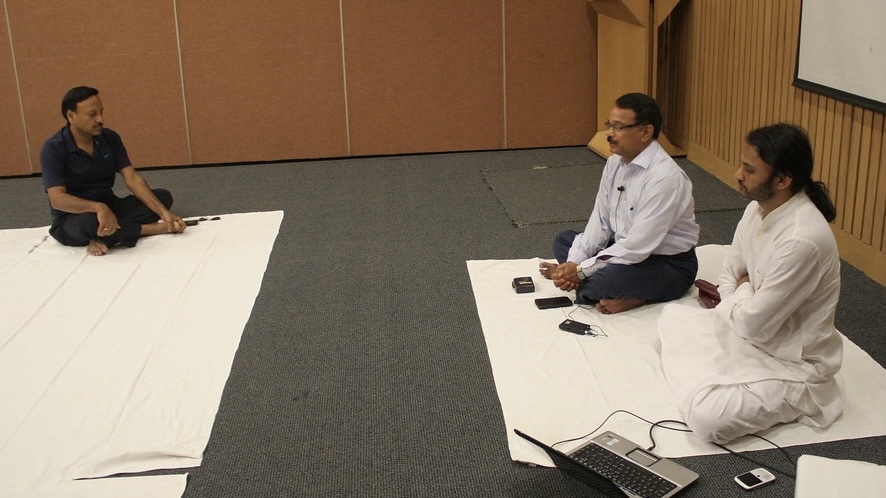
Restlessness to Disease
7 months ago By Yogi AnoopOne whose journey has been completed, he no longer remains a traveler.
Just as when a traveler reaches his destination, then to call him a ‘traveler’ becomes meaningless—in the same way, a sādhaka whose sādhana has been completed, within whom no goal remains anymore, to call him a sādhaka also is not appropriate. A sādhaka is one who is still on the path, who is moving toward the goal.
If this condition is deeply contemplated upon, then it becomes clear that the person who has attained the complete experience of life, who has touched the truth from within—in his nature, no hurry, no impatience remains. He does not fall prey to any kind of hurry—not in thinking, not in speaking, not in walking.
But if in any person’s behavior still there appears any unregulated speed—speaking excessively, changing decisions again and again, intense instability in thoughts, or unnecessary activity of motor and sensory organs—then this is an indication that he is still ‘on the path’, not ‘at the destination’. And he too is on the wrong path which in the future will lead to mental and physical illness.
Along with that, what to say of that character (that kind of person) who while speaking, gives jerks in his motor organs. He is a very fake and impractical type of person. No matter how many logical and knowledge-filled things he may say, no matter how many big things he says on philosophy and sādhana—if upon activation of one or two senses, the other motor organs also become hyperactive, then it means that in his spirituality and thoughtfulness there is very little experiential depth. This directly means that even while speaking peaceful things through the sensory organs, tension is arising in the motor organs. Just like when there is anger in the sensory organs, then tension arises in the motor organs (hands and feet). When anger comes, the person starts hitting.
Like it can be understood from another example—while giving a discourse (a sensory act) on any subject, if in hands and feet (motor organs) there appears extreme restlessness, then it is known that whatever is being said is merely experience-less talk and along with that, inside him the repetition of thoughts is more—only then do other senses get time to act. This directly means that whatever he is speaking, even his own senses are not getting calm—so what is the guarantee that through his knowledge-filled words, stability can come in others’ lives?
If from the words of the wise speaker, his own many senses are not becoming inactive, then what guarantee is there that he will be able to calm others? When the speaking sense of the speaker, which is extremely connected to his other senses, is not producing a good effect, then what is the guarantee that he will be able to bring peace and stability in others?
This directly means that even his own senses are not getting attracted towards stability through his intellectual arguments. The senses (5 sensory organs, 5 motor organs, and mind) are still restless, then his knowledge has not yet become practically self-attained. He is still a seeker, a traveler—not reached the state of realization.
This is not only spiritual, but psychologically also to be understood. The person who remains continuously hyperactive—who at every moment wants to do something, to achieve something, to think, to run—within him lies a deep insecurity and incomplete search. This is not wrong but it means that in the search, depth is lacking.
The science of the inner being says that such continuous restlessness—whether physical or mental—not only gives birth to decision fatigue and cognitive overload, but also causes serious harm to the body.
• Increased heartbeat, high blood pressure, hormonal imbalance, excessive secretion of cortisol in the brain, lack of sleep, and long-term stress-related illnesses—like stroke, depression, anxiety, etc.—are often linked with this kind of hyperactive lifestyle.
In contrast, the person who has attained stability in the inner being, his outer senses—motor and sensory organs—also come naturally into balance. He does not see more than necessary, does not speak more, does not walk more. In each of his behaviors, there is a kind of peace, seriousness, and meaningfulness. While living in the world, he does not get trapped in its ‘motion-pressure’.
He does not want to make an impression, nor prove anything to anyone. His actions now arise not from reactions, but from realization. This stability is the direct evidence of his most profound sādhana.
Therefore, from the perspective of my sādhana—wherever there is hyperactivity, there the search is still incomplete. Where the senses are calm, there the journey has been completed.
Recent Blog
Copyright - by Yogi Anoop Academy
